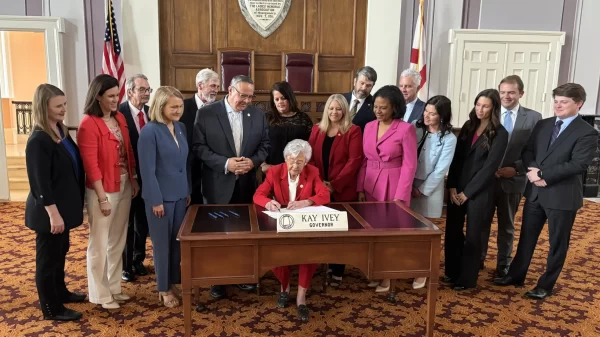By Chip Brownlee
Alabama Political Reporter
MONTGOMERY—The regular legislative session of the Alabama Legislature is set to convene in less than two weeks, but legislators are already considering another change to the State’s budgeting models in both the General Fund and the Education Trust Fund.
On Tuesday, members of the House and Senate General Fund and Education Trust Fund budget committees met in Montgomery to hear pitches for two different types of budgeting models: evidence-based budgeting for the General Fund and outcome-based budgeting for the Education Trust Fund.
In both models, results should be the key to appropriations, according to the presenters from The Pew Charitable Trusts, the MacArthur Foundation, the Tennessee Higher Education Commission and the Lumina Foundation’s Strategy Labs.
Ronojoy Sen, a senior associate with the Pew-MacArthur Results First Initiative, and Toby Barker, a Mississippi state representative, told legislators they should consider allocating funds on an evidence-first approach — funding agencies based on a cost-benefit analysis and whether the State gets a good “bang for its buck.”
Mississippi uses evidence-based budgeting, Barker said, and has seen success.
“We’re probably halfway into that, but we’re starting to see results.”
The funding model makes agencies justify their spending and appropriations. Alabama has used a similar approach in the past, under the administration of Gov. Bob Riley. The program, called SMART budgeting, required agencies to goals and justify their spending accordingly.
But legislators abandoned the old performance-based budgeting program in 2012 under Bentley because the program didn’t seem to make a meaningful difference in appropriations, largely because the State earmarks most of its revenue.
In Mississippi, it’s unclear how successful the budgeting scheme is. Earlier this month, Gov. Phil Bryant, R, announced $50 million emergency budget cuts, the fourth round of cuts in a year. The governor was forced to play the cutting game because, like Alabama, Mississippi has a balance budget requirement.
For education, the topic of conversation: implementing an outcome-based budgeting model in Alabama — a form of budgeting that rewards performance results like degree attainment instead of student enrollment.
Mike Krause, executive director of THEC, said Tennessee was able to become the first state in the country that provides free community college for both adults and recent high school graduates.
“We made a decision to fund our colleges solely based on the number of Tennesseans that succeed, not the number of students who show up,” Krause.
In Tennessee, students are covered to attend any of the state’s 13 community colleges or 27 technical colleges without paying any tuition. Krause said the state’s ability to provide that funding based on saving from outcome-based budgeting.
In 2015, Tennessee began implementing its “Drive to 55” initiative, with the goal of equipping 55 percent of Tennesseans with a college degree or secondary certification by 2025.
Drive to 55 encompasses the Tennessee Promise, a scholarship program that provides the free community college tuition for high school graduates, and the Tennessee Reconnect, a grant program that allows any adult to attend and earn a diploma at any of the Tennessee Colleges of Applied Technology.
“If you’re not inspired by this, I don’t what will do it,” said Sen. Arthur Orr, the chairman of the Senate education finance and taxation committee. “We can do much better in our state … at how we approach education and higher ed for our students.”
Alabama currently sits fourth from the bottom in terms of secondary education attainment across the U.S. About 36.7 percent of Alabamians have some type of post-secondary educations.
On the other hand, about 23 percent of Alabamians have “some college, but no degree” indicating that they dropped out of college, and they likely incurred some debt in the process. The outcome-based budget process, Krause said, is intended to make universities focus on success instead of enrollment.
Implementing the performance-based budgeting formulas would reward universities based on different formulas that take into account graduation rates, retainment and other indicators of academic success.
Previously, schools in Tennessee, like Alabama’s, were awarded state funding depending on how many students they had enrolled on the 14th day of class, among other parameters.
Twenty-five states across the U.S. have begun implementing some type of outcome-based budgeting model, and eight others are in development.
With the new program, each student that hits credit-hour-based benchmarks triggers new funding for their school. In addition, the funding design, Klause said, has also led to more mandatory advising, one-stop guidance shops and early warning systems that trigger counseling for students who stop attending classes.
The plan would likely take several years and several million dollars to fully implement and would require cooperation from the state’s four-year and community college systems.
Sen. Gerald Dial, R-Lineville, raised concern students would veer away from more expensive four-year colleges in favor of the tuition-free community colleges if a plan like Promise was introduced in Alabama. Krause, who is the head of the higher education authority of his state, said they haven’t seen that problem.
“If you were one of the students trying to decide between the University of Tennesee and Tennessee Tech University, you were probably not [who were we trying to reach],” Krause said. “I’m trying to reach the student who’s trying to decide between going straight to work at a construction site or doing something else in the college sector.”
Tennessee has seen only a 3 percent shift from it’s public four-year universities to its community colleges over the years of implementation, Krause said. Additionally, the state has seen a decrease in student debt and an increase the college attendance rate of 4.6 percent over a one-year period.
Bill Poole, R-Tuscaloosa, was also concerned that some universities, like the regional four-year schools and HBCUs, would be deterred from taking low-income or at-risk students who may not perform at a high level.
Krause said the system in Tennessee allows universities to weight their formula in a way that provides more funding for at-risk students and adults, resulting in nearly two-thirds more funding for those populations.
One problem will likely prevent legislators from implementing a plan like Promise or Reconnect in Alabama: the lack of an education lottery. During Krause’s presentation, Rep. Pebblin Warren, D-Tuskegee, asked how Tennessee paid for the programs, other than the savings from performance-based budgeting.
More than $1.4 million in money raised from Tennessee’s education lottery helped the state cover the 5,000 adults who have signed up for tuition-free community college. The rest was paid for through federal pell grants.
Tennessee’s lottery, like Georgia and Florida’s, also funds the HOPE scholarship, a state-supported merit-based scholarship that gives students the funds to attend any of the state’s four-year universities.
Last year, Gov. Robert Bentley proposed a lottery bill to the state Legislature, but it failed during a special session over the summer. His bill, however, was not intended to supply more funding for education.
Instead, it was designed to prop up the state’s beleaguered General Fund, which has faced shortfalls for years caused mainly by increasing costs in the Department of Corrections and the state Medicaid Agency.
Email Chip at cbrownlee@alreporter.com or follow him on Twitter.




















































